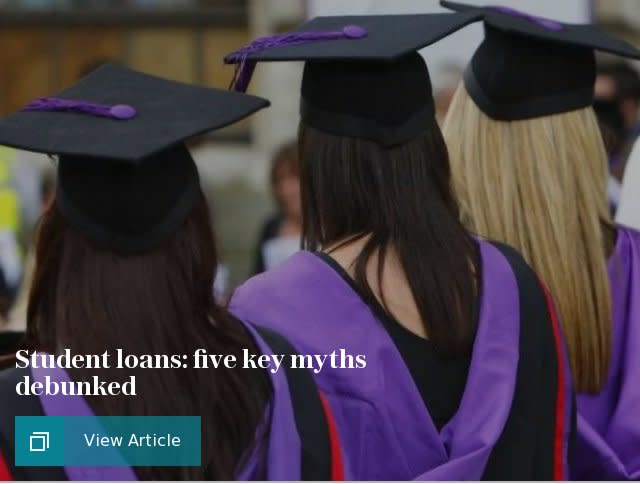How HMRC is to blame for thousands of graduates overpaying student loans

Tens of thousands of graduates are clearing their student loan and yet continuing to pay thousands of pounds to the Student Loans Company, thanks to outdated systems used by HMRC to collect borrowers’ money.
In some cases “overpayments” continue being made for well over a year and in the worst cases amount to as much as £10,000.
Borrowers who overpay face a long wait for refunds which, when they come, are paid with a derisory rate of interest. The errors have other ramifications, including wrongly limiting the size of mortgages that lenders would be prepared to advance to graduates.

Figures released under the Freedom of Information Act show that almost 90,000 students continued making payments on their student loans after they had already repaid it in full in the 2015-16 tax year, the latest period for which figures are available. A total of £51m was overpaid during that year.
Experts branded the level of overpayment “staggering” and said that the Student Loans Company should be doing more to offer graduates a transparent and efficient service, with one MP demanding in Your Money today that the quango “end the scourge” of making borrowers overpay.
Telegraph Money has reported extensively on the problems of student loans’ high interest rates and complicated structure. But now we can disclose how poor technology and communications are creating a different sort of problem altogether for borrowers.
What is going wrong?
The majority of students repay their loans through their payroll, with the money being collected by employers and paid to HMRC. Employers must report these figures to HMRC monthly, and graduates can see on each payslip how much they have repaid.
Those who took out a loan before September 2012 will repay 9pc of any earnings over £17,775, while those who took out loans after September 2012 will repay 9pc of anything over £21,000.

Despite HMRC collecting repayment information monthly, it only reports the figure once a year to Student Loans Company – at the end of the tax year. Nor does HMRC pass on the information immediately.
In fact, the Student Loans Company has indicated that some data reaches it only seven months after the tax-year end. This means some graduates will wait until November to find how much they have paid.
The figures will only be accurate to April 5 of that year, meaning the statement is already months out of date when it is sent.
It is only once the Student Loans Company has received this information that it calculates the loan outstanding on the account – which is when it becomes clear that some have overpaid.
Graham Farquhar, a partner at accounting firm RSM, said: “It’s disappointing. HMRC is keen that employers pay everything in real time and there is no such thing as a year’s grace. It’s interesting that this doesn’t seem to apply to HMRC itself.”
He added that both the Student Loans Company and HMRC claim they are working on the problem, but this is not apparent in the figures. The number of graduates overpaying has increased by 80pc in the past six years.
Angela Rayner, the shadow education secretary, demanded urgent improvements.
“It is absolutely staggering that some graduates have been forced to hand over more than £10,000 that they didn’t even owe. The Government should give graduates a fair deal,” she said.
“Ministers needs to look urgently at establishing a better working relationship between the Student Loans Company and HMRC.”
“We first raised these issues with the Government nearly a year ago, but these revelations show that they are doing nothing to actually end the scandal of overpayment, leaving tens of thousands of graduates to foot the bill for their failure,” she added.
Neither HMRC nor the Student Loans Company explained why it took so long for the data to be passed on.
“My gut feeling is that it is not a priority and that there are probably other aspects, such as the collection of taxes, that are higher on the agenda than the repayment of student loans,” said Mr Farquhar.
“But surely in this modern day and age, with the technology we have at hand, you would think individuals would be able to get repayment information much sooner.”
He explained that the data was readily accessible but surmised that the issue was “not sufficiently important for HMRC”.
“You would really expect the Student Loans Company to be working harder to change that,” he added.
Graduates will only be paid interest on any overpayment for 60 days after the Student Loans Company tells the borrower they have overpaid. After this, it pays no interest.

Currently interest on any overpaid money for those with pre-2012 loans is paid at the lower of RPI and Bank Rate (so currently 0.25pc) and for those with loans after 2012 at RPI (currently 2.6pc).
A spokesman for the Student Loans Company said: “HMRC and Student Loans Company continually explore how we can manage repayment information more effectively, including sharing repayment data more frequently.”
The Student Loans Company advised any student who is nearing the end of repaying their loan to call for a more up-to-date figure of how much they owe. But this will still be based on the latest information provided by HMRC, which could be very outdated.
Graduates can cancel their repayments through their payroll and set up a direct debit for repayment. Or, if they have the cash to hand, they can pay off the remainder of the loan in one lump sum.
Mr Farquhar agreed that graduates themselves need to be more engaged with the loans system.
“I would encourage those who graduated about four or five years ago to really look closely at their repayments, and how close they are to paying it off,” he said.

 Yahoo News
Yahoo News 
